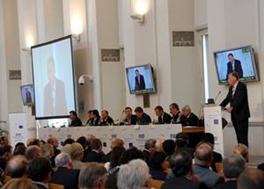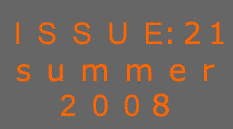
Nuclear Forum working on roadmap for the development
of nuclear in the EU
The latest meeting of the European Nuclear Energy
Forum (ENEF), took place in Prague (Czech Republic) on 22-23
May. The second meeting of the European Nuclear Energy Forum
(ENEF) was officially opened by EU President, José Manuel
Barroso, together with Mirek Topolanek, Prime Minister of the
Czech Republic; Robert Fico, Prime Minister of Slovakia and Gediminas
Kirkilas, Prime Minister of Lithuania.

Also in attendance were EU Energy Commissioner,
Andris Piebalgs, senior EC officials, MEPs, industry leaders
and a broad range of representatives of civil society. The focus
of the meeting was the work of the three ENEF Working Groups
(WGs) that were established at the first ENEF meeting, in Bratislava
(Slovakia), last November, namely the Opportunities, Risks and
Transparency WGs.
At the Prague meeting, the chairmen presented synthesis reports
on the work of the working groups that were debated by the nuclear
forum. FORATOM and the whole nuclear industry have been closely
involved in the drafting of these reports. They will be used
to determine the main issues that have to be tackled and the
appropriate solutions that are required to promote the continued
development of nuclear energy in Europe.
The creation of ENEF was initiated by the March 2007 European
Council, when Member States suggested “that broad discussion
takes place among all relevant stakeholders on the opportunities
and risks of nuclear energy.” The Forum’s creation
shows that nuclear will now be treated on a level footing with
other major energy sources that have had similar forums for some
time. Nuclear energy’s contribution, as part of an overall
energy mix that includes renewables, to ensuring security of
energy supply and combating climate change has now been officially
recognised.
ENEF should provide advice to European policy
makers, mainly in the European Institutions on: security of energy
supply, incentives for investment, EU legislative issues, public
opinion, R&D, knowledge management, safety and waste management.
It is also expected to work in collaboration with other newly-created
bodies the Sustainable Nuclear Energy- Technology Platform (SNE-TP),
and the High Level Group on Safety and Waste management (HLG).
The Forum aims to promote an inclusive, transparent and non-ideological
debate on nuclear between all the relevant stakeholders. It gathers
for the first time a broad range of stakeholders – the
nuclear industry, public authorities, the financial community
and various sections of civil society.- in a debate on the future
of nuclear energy in Europe.
At the first meeting in Bratislava (Slovakia), it was agreed
to establish three working groups that are in charge of analysing
three main issues: the opportunities of nuclear (financing,
competitiveness), the risks of nuclear (safety, waste management,
training and
education), and information and transparency (better information,
trust and confidence/ implementation of the Aarhus convention,
best practices). The working groups have already met twice
since the Bratislava meeting and are in the process of drafting
proposals
in order to enable ENEF to provide a roadmap for the continued
development of nuclear energy in the European Union. Every
working group has created subgroups in order to dwell on
specific topics
(1).
The Nuclear Forum is taking concrete steps to provide guidelines
to help nuclear power contribute to the development of Europe’s
low-carbon economy. It is more than ever essential to take part
in ENEF in order to shape Europe’s energy future.
|

